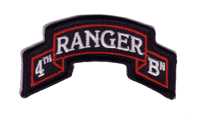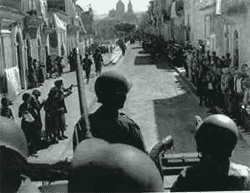4th Battalion
 Active from 8 June, 1943 to 24 Oct, 1944
Active from 8 June, 1943 to 24 Oct, 1944
(per Ranger Memorial Fort Benning, GA)
My short, but vivid memories served with F Company of the 1st Ranger Battalion were now history. We survived the Arzew landing with a surprise attack taking out the big coastal guns on the high ground overlooking the Bay of Arzew. The French called this Superiur with Ft. Du Nord to the right. We trained night and day at Arzew until we were called for a mission in Tunisia. The object mission was Sened Station, a raid with Companies A, E, and F. The Battalion was airlifted to an airport near Gafsa. We had very little information about this raid other than to get about ten prisoners and wipe out this outpost. I called this one a good mission; it was what we had been trained for.
We were saddened at the loss of Elmer Garrision, F Company.
After the Tunisia campaign on April 19, the battalion returned to Nemours to form up two new battalions to be known as the 3rd and 4th Rangers. E and F companies were to form the 4th Battalion. Captain Roy Murray with Captain Walter Nye as his executive officer, was in command of the 4th Battalion. We were now getting many volunteers to complete the battalions and get ready for our next mission, which was Sicily.
On boarding ship, I was struck down with an appendix attack. Dr. Hardenbrook ordered me taken off this ship to a station hospital in Oran, where I had surgery. The next news I heard was that the Rangers had landed in Gela, Sicily on July 10, 1943. This was where my good friend Walter Wojcik lost his life when a mine exploded on the beach.
After my one-week hospital stay and month long recovery period, it appeared that no attempt was going to be made for me to rejoin the 4th Ranger Battalion. That was the way the Replacement Centers operated. I decided to go AWOL with three other soldiers. We got to Palermo, Sicily where we commandeered a car, got some C-rations and Jerry cans with gas. We struck out to look for the 4th Battalion, which we found near Caltanessetta. The 4th Battalion was now outfitting and getting ready for the Italian invasion. Again, we trained night and day for who knows what lay ahead.
Our next mission was the beachhead at Maiori, Italy. The 4th Battalion landed after midnight September 9, 1943 and occupied the town. Quickly, the 1st and 3rd Battalions passed through the town and occupied the high ground overlooking the plains of Naples and Mt. Vesuvio. The 1st and 3rd occupied the Chiunzi Pass area and stayed there about three weeks where many battles were fought. The 4th Battalion occupied the extreme left flank of the Lattari Mountains, where it stayed about three weeks. The element of surprise was the Rangers answer to a good mission.
Finally, the 8rh Army reached us and the Germans pulled back to the winter line north of the Volturno River. We had a brief rest in Naples, then were pulled back to the sinter line north of the Volturno River. We had a brief rest in Naples, then were pulled back to Sorrento for rest and refitting. The 4th Battalion occupied a large schoolhouse and the Tramontano Hotel. We had a good time there; the food and weather were both better. Also, we had a few trips to the Isle of Capri.
Some soldiers were fighting malaria and jaundice. I came down with jaundice about October 15th and it laid me low. The medics said to eat white bread and candy. I hadn't seen either of those since the States.
Our next mission was on November 4th to cross the Volturno River to occupy Mt. Cannavinelle and prevent German forces from getting through the hairpin curve on Highway 6 going to Venafro. We were told three U.S. divisions were to cross the Volturno and make an envelopment on our positions to relieve us on the 4th or 5th of November 1943.
Captain Nye, with E and F companies in his command, led us to our next objective, which we reached by sun-up. At 6:30 a.m. on November 4th, we had the two companies take a break to eat and smoke in a draw near our objective. Captain Nye and I cut the wire to take their OP out. It was probably occupied, but we didn't check it out. We didn't go far as we saw three German companies coming up the hill towards us. They stopped when they saw us, about 200 yards away.
Captain Nye said, "Don, you cover me and I will indicate they should surrender." About one minute later, they went right and left into fire position. Nye, the radio operator and I got over the ridge and dropped back about 200 yards in a good defensive position. We decided to bring E Company up. When they got to us, I sent one platoon to the left flank where Captain Nye was and one platoon was with me to watch the right flank. It wasn't long before the Germans came over the ridge in the wide open. I would guess there were about fifty men. They were company front and coming over open terrain. At 100 yards, I gave the order to fire. The Germans stopped and ran off the hill below the ridgeline. They left their casualties behind.
About fifteen minutes later, below us on Highway 6, tanks and armor moved up and took us under fire with 88 shells. Again, the Germans sent their companies against us and again the Rangers turned them back. This time, I had two wounded men in a draw below me. I went down to see what I could do. They were in bad shape. I was just about to give them morphine when I looked up to find I was covered by eight Germans. Behind them were Lodge, Ryan, and Rodriguez with their hands up. They had run out of ammo and were flanked and taken prisoner. I had to help carry wounded Germans as I was led to Venafro.
We came to a building where inside about 50 Germans lay on the ground. My captor, who had a Luger barrel to my neck, said, "Look!" They wanted me to see their casualties. Shortly, a German lieutenant who spoke good English, came up and said, "Are you Lt. Frederick?" I said, "Yes." He held out his hand and said, "Congratulations on the firefight we had today." He then asked why so many of his men were shot through the head. I said, "You came at us three times and then dropped back to Hill 689 where you had prepared positions. This was the only target my men had." He said that was true. Then he told my captors to get me some food and anything else I could use. We shook hands and he said, "Tomorrow, I may be in your position."
I believe this lieutenant probably saved my life by showing up when he did. They were going to fly me to Berlin, but due to weather conditions, we took a boxcar with eight British officers to Berlin. My war was now over, or was it just starting?" This was not a good mission-no air, artillery, or tank support. You don't fight tanks with M-1 rifles.
I was in solitary confinement a month, then sent to officer camp in Poland. It was here that I met Captain "Bing" Evans, Captain Kitchens, Lt. Teal, and other Ranger officers who told me about how the Anzio campaign ended. After 17 months, on January 21, 1945, we started walking back into Germany. My diary says it was about 576 miles before we reached Hammelburg, Germany. It was there I was liberated by Captain Baum of the 4th Armored Division, and recaptured. The war was soon to end.
Col. Murray spent a week at my home in 1998. We re-fought many battles, some good missions and some bad. He sent me a 4th Ranger cap after this and I treasure it. A good Battalion C.O. for the 4th Rangers and I was glad to be under his command.
- Contributed by Donald S. Frederick
1st & 4th Ranger Battalion
(Ranger Frederick was a POW at Oflag 64 for 18 months.)

(US Army Photo Public Domain)
Our hearts join together in sorrow for their loss; but also our hearts swell with pride to have fought along side such valiant men. They will never be considered dead, for they live with us in spirit.
When this war comes to an end, most of you will return to the way of life which you fought so hard to return to- to pick up the threads of your civilian pursuits. You will bring back with you many nostalgic memories of your fighting days- both bitter and pleasant. But above all, you will bring back with you many personal characteristics enriched by your experience with the Rangers."
- William O. Darby
(courtesy James Altieri author of Darby's Rangers)
Recommended Ranger Links
- Research Reading List
- Rangers in World War II (An excellent comprehensive account of all six Battalions by Ranger Robert W. Black)
- Darby Foundation
- Commendation - Meritorious Service
- First Special Service Force (to which many 4th Ranger Btn and RFHQ soldiers were assigned after Cisterna)
 DESCENDANTS OF WWII RANGERS, INC
DESCENDANTS OF WWII RANGERS, INC 